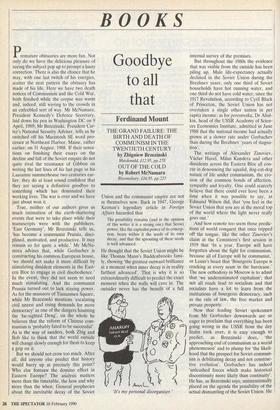BOOKS
Goodbye to all that
Ferdinand Mount
THE GRAND FAILURE: THE BIRTH AND DEATH OF COMMUNISM IN THE TWENTIETH CENTURY by Zbigniew Brzezinski
Macdonald, £12.95, pp.278
OUT OF THE COLD by Robert McNamara
Bloomsbury, £16.95, pp.223
Premature obituaries are more fun. Not only do we have the delicious pleasure of seeing the subject pop up to prompt a hasty correction. There is also the chance that he may, with one last twitch of his energies, scatter the neat pattern the obituary has made of his life. Here we have two death notices of Communism and the Cold War, both finished while the corpse was warm and, indeed, still waving to the crowds in an enfeebled sort of way. Mr McNamara, President Kennedy's Defence Secretary, laid down his pen in Washington DC on 9 April, 1989; Mr Brzezinski, President Car- ter's National Security Adviser, tells us he switched off his Macintosh SE word pro- cessor at Northeast Harbor, Maine, rather earlier, on 31 August, 1988. If their sensa- tions on finishing their essays on the decline and fall of the Soviet empire do not quite rival the resonance of Gibbon on writing the last lines of his last page in his Lausanne summerhouse two centuries ear- lier, they do at least sound confident that they are saying a definitive goodbye to something which has dominated their working lives. The war is over and we have just about won it.
True, neither of our authors gives us much intimation of the earth-shattering events that were to take place while their manuscripts were with the publishers. 'East Germany', Mr Brzezinski tells us, 'has become a communist Prussia, disci- plined, motivated, and productive. It may remain so for quite a while.' Mr McNa- mara advises that, while Gorbachev is constructing his common European house, 'we should not make it more difficult by stimulating dissident elements in the East- ern Bloc to engage in civil disobedience.' In the event, they did not seem to need much stimulating. And the communist Prussia turned out to lack staying power. As for the massacre of Tiananmen Square, while Mr Brzezinski mentions 'escalating civil unrest and rising demands for more democracy' as one of the dangers haunting the 'far-sighted Deng', on the whole he believes that the reform of Chinese com- munism is 'probably fated to be successful'. As is the way of insiders, both Zbig and Bob like to think that the world outside will change slowly enough for them to keep a grip on it.
But we should not crow too much. After all, did anyone else predict that history would hurry up at precisely this point? Who else foresaw the domino effect in Eastern Europe? The analysis matters more than the timetable, the how and why more than the when. General prophecies about the inevitable decay of the Soviet
Union and the communist empire are not in themselves new. Back in 1947, George Kennan's legendary article in Foreign Affairs hazarded that
The possibility remains (and in the opinion of this writer it is a strong one) that Soviet power, like the capitalist power of its concep- tion, bears within it the seeds of its own decay, and that the sprouting of these seeds is well advanced.
He thought that the Soviet Union might be like Thomas Mann's Buddenbrooks fami- ly, showing 'the greatest outward brilliance at a moment when inner decay is in reality farthest advanced'. That is why it is so extraordinarily difficult to predict the exact moment when the walls will cave in. The outsider never has the benefit of a full
'It's my personal disorganiser.'
internal survey of the premises.
But throughout the 1980s the evidence that was visible from the outside has been piling up. Male life-expectancy actually declined in the Soviet Union during the Brezhnev years; only one third of Soviet households have hot running water, and one third do not have cold water; since the 1917 Revolution, according to Cyril Black of Princeton, the Soviet Union has not overtaken a single other nation in per capita income; as for perestroika, Dr Abal- kin, head of the USSR Academy of Scien- ces Economics Institute, admitted in June 1988 that the national income had actually grown at a slower rate under Gorbachev than during the Brezhnev 'years of stagna- tion'.
The writings of Alexander Zinoviev, Vaclav Havel, Milan Kundera and other dissidents across the Eastern Bloc all con- cur in denouncing the squalid, dog-eat-dog nature of life under communism, the ero- sion of the common bonds of affection, sympathy and loyalty. One could scarcely believe that there could ever have been a time when it was possible to say, as Edmund Wilson did, that 'you feel in the Soviet Union that you are at the moral top of the world where the light never really goes out.'
And how remote too seem those predic- tions of world conquest that once tripped off the tongue, like the other Zinoviev's claim at the Comintern's first session in 1919 that 'In a year, Europe will have forgotten about the fight for communism, because all of Europe will be communist,' or Lenin's boast that 'Bourgeois Europe is cracking at every seam in the hurricane.' The new orthodoxy in Moscow is to admit that 'we underestimated capitalism', that not all roads lead to socialism and that socialists have a lot to learn from the institutions of bourgeois democracy, such as the rule of law, the free market and private property.
Now that leading Soviet spokesmen from Mr Gorbachev downwards are so eager to proclaim that everything has been going wrong in the USSR from the day Stalin took over, it is easy enough to predict, as Brzezinski does, 'the approaching end of communism as a world phenomenon' and to plump for 'the likeli- hood that the prospect for Soviet commun- ism is debilitating decay and not construc- tive evolution'. Gorbachev has indeed 'unleashed forces which make historical discontinuity more likely than continuity'. He has, as Brzezinski says, unintentionally placed on the agenda the possibility of the actual dismantling of the Soviet Union. He
may search, as well-intentioned pastors in East Germany are still searching, for a Third Way between communism and capi- talism, but no such half-way house exists. Either you have a centralised totalitarian state or you have a decentralised, self- managing democracy. And people know which they want.
Now Brzezinski, and McNamara in a more plodding way, show well enough the mechanics of Soviet failure — the dead weight of the bureaucracy, the unproduc- tiveness of the collective farms as opposed to the peasant plots — but they leave one a, little puzzled and unsatisfied at the end of it all. If it is all over with communism and the Soviet empire, or will be by the end of the century anyway, why did they have such a short run? Seventy or 80 years is not much of a lifespan for an empire, especially one which is so ruthless, so obsessed with the pursuit and retention of power at ell costs. Leninism, of all ideologies which have ever gripped the human mind, ought to have been the hardest to eradicate, untempered as it was by any restraints of natural or supernatural law. Other empires, just as corrupt and incompetent and considerably less ruthless, have lasted a great deal longer. And if we are honest with ourselves, we must admit that we are surprised by the rapidity of the collapse of Soviet self-confidence and of its will to go on imposing its rule over Central Europe.
This is surely the most teasing of all questions thrown up by these extraordin- ary events. I think Brzezinski more or less has the answer, or points to it anyway, before gliding away from it again. 'The Soviet empire in Eastern Europe is almost unique in imperial history,' he declares. 'The dominant nation is not viewed by the subject people as culturally superior.' And one might add, even the master race is by no means convinced of its own mastery. This is an imperial power with an inferior- ity complex — a dangerous and ultimately fatal combination. We are all aware of the irony that the Great Revolution should have taken place not in an advanced 'ripe' industrial country, as Marx predicted, but rather in a backward, although fast mod- ernising, Asiatic despotism. No Marxist dialectics, however ingenious, could con- ceal the fact that History had not behaved as she was supposed to.
This curious circumstance has surely done a lot to breed the boastful, prickly, suspicious character of Soviet behaviour towards the outside world. The typical imperial power does not have to say 'we will bury you', or to be constantly making detailed pseudo-scientific prophecies about the increase in production which will en- able it to overtake its rivals by such and such a date. Its superiority — in culture, technology, administration — is accepted on all sides, revelled in by its own citizens, resented by its colonial peoples, feared and emulated by outsiders. But to be governed by uncultured alien clods is quite a diffe-
rent form of humiliation.
For this reason, even Soviet communism cannot do without at least a bogus imita- tion of the things it really despises — codes of law, elections, a constitution stuffed with human rights. Socialism is at heart a reactionary faith, an attempt to re- establish tribal solidarity in a modern guise. But, if it is to look at all convincing, it must be able to show off the togs of bourgeois individualism as well. By making a mockery of these bourgeois trappings, the 'leading role of the Communist Party', in the long run, undermines the authority of the communist state, and exposes its moral as well as its technical and economic backwardness. When Gorbachev laments that 'our political culture is still inadequ- ate' and that 'we are now going through the school of democracy afresh', he is criticis- ing not just communist practice but com- munist theory, which was, after all, dedi- cated to pulverising political culture.
What the Cold War — not a very apt phrase — has really been about is the exposure of this sham. The West had to go on and on until the fraudulence of the whole Soviet system has been thoroughly demonstrated. Mere military deterrence could only be part of the enterprise, since so long as communist ideology retained its self-confidence, the Soviet Bloc was bound to retain ambitions to expand by any available means.
I am not sure that Mr McNamara quite understands this. He constantly talks about our 'misperceptions' of the Soviet threat, about the enormous cost of the Cold War, about President Reagan's 'simplistic mis- reading' of the Kremlin's intentions. He believes, along with other former leading American statesmen — Cyrus Vance, McGeorge Bundy, Admiral Elmo Zum- walt — that in recent years, the United States has 'strayed in the direction of doing too much rather than too little' in its defence effort. In the Gorbachev years, he deplores the American response as 'skep- tical, unimaginative and very cautious.'
Admittedly, he rather undermines his own argument by enumerating, with en- dearing honesty, the occasions on which the USSR has justified the West's worst suspicions — the 'naked aggression' of the Korean War, the period in the late Seven- ties when pro-Soviet communists seized
'Here's your poll-tax form.'
power in Vietnam, Laos, Cambodia, Angola, Ethiopia, Afghanistan and South Yemen, the,'spirit of adventurism' in which Khruschev charged into Cuba. Even so, he argues that there were also moments when, if the United States had read the Kremlin better, they would have been able to scale down the arms race and edge East-West relations in the direction of lasting peace. We could have had security at a lower cost — look at the hideous expense of that exercise in science fiction, the Strategic Defence Initiative.
But I don't think that security was all we were after. Our aspirations went beyond the policy of 'containment' which Kennan so brilliantly elaborated. We were also out to show them. However vulgar the display, we could not duck out of the competition; the West had to prove that it could out-jump, out-sing and outlast the East in every department — economic, technical, military and, above all, moral. There was bound to be a disproportionate extrava- gance about this space-age version of the Field of the Cloth of Gold because we were competing against a barbaric Asiatic pow- er. We should be grateful for Reagan's Hollywood experience rather than snob- bish about it, for it gave him the instinctive grasp of the need to flaunt the effortless abundance of the West. The Strategic Defence Initiative — and above all the Brilliant Pebbles concept — was not an aberration, but the glorious culmination of the contest, the clincher.
Older readers will remember the debate in the Sixties about whether the fat com- munist or the thin communist was prefer- able. Was the system more likely to reform itself if the Russians were encouraged along the road to some semblance of a consumer society? Or would 'we do better if they were starved into a recognition of the bankruptcy of communism? As it turned out, the 'thin-communist' strategy has won hands down. Every time the Soviets have been encouraged by some success — whether in outer space or darkest Africa — they have become aggressive, adventurist and insufferable. Gagarin 1961 — Cuba 1962. The American defeat in Vietnam and the Watergate debacle were followed by the impudent expansionism of the middle Brezhnev years. By contrast, every time the Soviet camp has been drenched in a sense of failure, its policies have staggered away from Leninism in the direction of democra- cy and peaceful co-existence. Therefore the mission of the West has been to discourage, unrelentingly, persistently and on all fronts. Taking one thing with another, by and large, with the odd lapse here and there, we have.
We are now being warned not to become too `triumphalise, not to succumb to com- placency nor swallow too easily Professor Fukuyama's little skit about us having come to the end of history. These warnings are, I think, misconceived. Nobody im- agines that parliamentary democracy, the rule of law and the free market together produce a flawless society or that we as individuals are morally superior. But we are right to make a song and dance over the communist world's acknowledgement that its system is inferior to ours. Triumphs over barbarism ought to be celebrated, if only to discourage other barbarians still unregenerate, whether crouching in senior common rooms or in the less enlightened parts of Africa and Asia. There is a time for rubbing it in.




















































 Previous page
Previous page